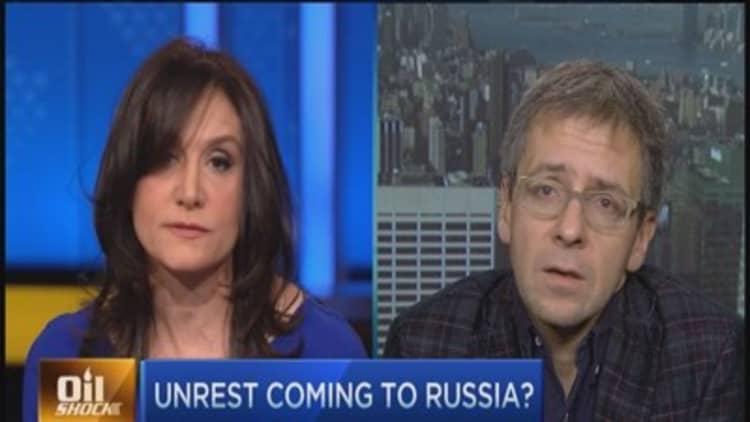Venezuela is desperate for cash.
Days after OPEC decided not to give into Venezuela's pleas to cut oil production, President Nicolas Maduro has begun talking up several moves to raise money, including plans to slash 20 percent of "unproductive" spending and an attempt at "perfecting" the country's foreign exchange system.
"Clearly the government is trying to send signs to the market that they are working on necessary adjustments that the economy needs in order to honor international commitments and keep up with social policies, which are essential for political stability," said Diego Moya-Ocampos, a senior political risk analyst at IHS. "However, these policy adjustments are not enough. This reflects simply that the government is desperately looking for funds to compensate for the lost revenues from declining oil prices."
Read MoreVenezuela's future? 'Barbarity and people looting
The sharp decline in oil prices—Brent crude is at a five-year low—is making Venezuela's autocratic government act swiftly. The commodity accounts for 95 percent of the country's export earnings.
Barclays predicts that the economy will contract 6.2 percent and inflation will surpass 120 percent in 2015. The IMF projects Venezuela's economy to decline by a more modest 1 percent.

Last week, Venezuelan Finance Minister Rodolfo Marco went hat in hand to China in a search for loans. He's expected to visit Iran and Russia next.
"We are thus skeptical that the economic team's plan to tap international lenders, including China, over coming weeks will yield any tangible results," Bank of America economist Francisco Rodriguez said in a recent note.
China has already loaned tens of billions of dollars to Venezuela—which Caracas repays in oil shipments. About half of the oil that Venezuela ships to China goes to paying down existing debt.
Read MoreCreating inflation is easy. Just ask Venezuela
But political instability could prompt China to cut back on what has been a critical source of revenue, analysts say.
"If that lifeline is cut, Venezuela doesn't have a whole lot of options," said Eric Farnsworth, vice president at Council of the Americas and Americas Society.
Perhaps the most interesting move by the cash-strapped country—and maybe the greatest sign of its desperation—is that the leftist leadership is in talks with Wall Street. Venezuela has been in conversations with Goldman Sachs to sell at a deep discount debt owed to it by the Dominican Republic and Jamaica, sources familiar with the talks told CNBC.
No deal has been struck at this stage, sources said. But such an agreement would turn debt that both countries owe to Venezuela under the Petrocaribe alliance into bonds that would be sold to investors. Petrocaribe is an 18-country cooperative agreement in which Venezuela, one of the members, provides oil to neighboring nations at low rates.
The move would be a good profit-making opportunity for the bank, which would get a significant discount on the debt and wouldn't hold the debt for too long, a person familiar with the talks said.
Read MoreVenezuela, with world's largest reserves, imports oil
Calls from CNBC to PDVSA, Venezuela's state-run oil and gas company, and to Maduro's office were not returned. An email to the Dominican Treasury also was not answered.
Venezuela's central bank announced Thursday that it will add diamonds and other metals and precious stones, as well as foreign currency, to its international reserves.
The South American country's international reserves have been under pressure, falling by more than a quarter in the last three years and raising concerns about its ability to pay debts. Venezuela recently used a $4 billion loan from China to boost reserves.
Despite Venezuela's moves to get liquidity, some experts say it won't be enough.
"This is not sustainable in the long term, unless you change the state, fiscal and economy policy," said Oswaldo Ramirez, director at ORC Consultores, a political consulting firm in Venezuela.


